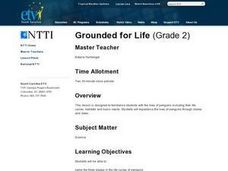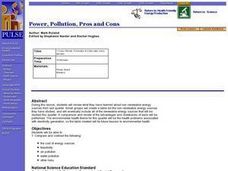Curated OER
Evaporation
Pupils break into small groups with four or five students per group. Each is given a styrofoam plate on which they write their group name on and 2 teaspoons of warm water. They place their plate on a paper towel somewhere in the room and...
Curated OER
Earth Processes
Fourth graders explore and discuss the process of evaporation. They discuss how wet things become dry. Students observe the process of evaporation and they make predictions about the observations they make about evaporation. Students...
Curated OER
Bell Live! The Great Lakes: A Superior Adventure
Students participate in a virtual field trip to Lake Superior. In groups, they perform experiments in which test the level of toxins and bacteria in the water. They also watch video segments life in the lake and discuss their observations.
Curated OER
Do You See What I See?
Second graders view a teacher-created terrarium, and complete a KWL chart. They discuss what they can see, Students go on a nature walk and compare the schoolyard to the terrarium, discussing the roles of rocks, plants, soil, and water...
Curated OER
The Radish Experiment
First graders grow radishes. In this Science lesson, 1st graders observe the growth of radishes in both the light and dark. Students discuss what plants need to live.
Curated OER
Seed Diversity
Students explore agriculture by researching different seeds. In this seed identification instructional activity, students collaborate in small groups to analyze a package of different seeds. Students utilize a magnifying glass to examine...
Curated OER
Predicting Plant Development
First graders investigate the basic needs of a growing plant and make predictions regarding what a seed needs in order to grow. They draw their seed predictions, listen to the book "From Seed to Plant" by Gail Gibbons, and analyze their...
Curated OER
Patty's Pumpkin Patch
Learners explore Halloween by examining pumpkins in class. For this pumpkin observation lesson, students discuss the method in which pumpkins are grown and the time line it takes a pumpkin to grow from a seed. Learners read a pumpkin...
Curated OER
Life Processes
Students investigate the basic needs of organisms that must be met in order to carry out life processes. They view a variety of organism that are meeting and competing for resources. Students create an Idea Web for the animals shown....
Curated OER
Turtle Hurdles
Students participate in a simulation in which they discover the threats to sea turtles throughout the world. In groups, they act out the life cycle of a sea turtle and describe the stresses that threaten their survival. As a class,...
Curated OER
Household Pests
Sixth graders discover the various habitat requirements for assorted household pests from ants to wasps. They conduct various activities including researching the life cycles moths, cockroaches, and mosquitoes
Curated OER
Emerging Viruses
Students study the characteristics of living things and explore the characteristics of viruses including their structure, function, and reproductive cycles. They also explore the impact of viruses on human health by discussing common...
Curated OER
Grounded for Life
Second graders become familiar with the lives of penguins including their life cycles, habitats and basic needs. Students will experience the lives of penguins through stories and video.
Curated OER
Lake Superior Ecology Unit
Sixth graders research Lake Superior and its ecosystem. Students investigate the lake's cycles of mixing and stratification and how these cycles affect the biology of the lake. This lesson plan contains five days of activities.
Curated OER
Building an Ecologically Balanced Living Space
Students design and build an ecologically balanced living space based on the principles of an old growth forest. They take one part of a house (or structure in the community) and redesign it according to the principles of the forest cycle.
Curated OER
Endangered Species- Florida Panther
Middle schoolers investigate the concept of the conservation of the Florida Panther and examine the effects of the Everglades water restoration project. They conduct a web based activity that includes the following: Listing what they...
Curated OER
Plants -- What Are Their Parts and Functions?
Students identify the parts of a flowering plant and their functions. They describe its life cycle as well. They compare the parts of the plant to the roles that are needed in a democracy.
Curated OER
Earth/Globe (poles & equator)
First graders create his/her own paper mache earth and label the poles and equator. The land masses can be added and labeling of specific bodies of water. The paper mache earth can then be used to discuss the sun, moon, and the earth and...
Curated OER
Power, Pollution, Pros and Cons
Students review what they know about non-renewable energy, compare and contrast advantages and drawbacks of each type, such as cost of energy sources, feasibility, air pollution, water pollution, and other risks, and create table listing...
Curated OER
Strangers in Their Own Land
Students use interview techniques to explore the traditional wisdom of fishers, farmers, First Nations, and other peoples whose close relationship with nature gives them a deeper understanding of, and sensitivity toward, climatic cycles...
Curated OER
Pond Exploration
Students take a hands-on approach to explore the world beneath the water in this activity. They examine the creatures they catch to study about the adaptations these animals have that allow them to survive in this harsh environment. They...
Curated OER
Day and Night
Students using experiments try to demonstrate how observations can be affected by the cycles of night and day.
Curated OER
When Fish Die
Pupils discuss what to do with a very sick fish and help it to die without much pain. As a class, they answer questions about the fish and if they believe it is suffering or not. Using their own experiences, they share how they dealt...
Curated OER
Photosynthesis: An enlightening experience
Students observe the effect of light on plants. They illustrate the exchange of gases between the atmosphere and the plant. Students see that plants are part of many natural cycles. They investigate how green plants use the sun's energy...
Other popular searches
- Water Cycle Diagram
- The Water Cycle
- Water Cycle Experiment
- Water Cycle Activities
- Water Cycle Stages
- Water Cycle Crossword
- Water Cycle Lesson Plans
- Water Cycle Reader's Theater
- Water Cycle and Evaporation
- Water Cycle Diagram Label
- Water Cycle Simulation
- Build Your Own Water Cycle

























